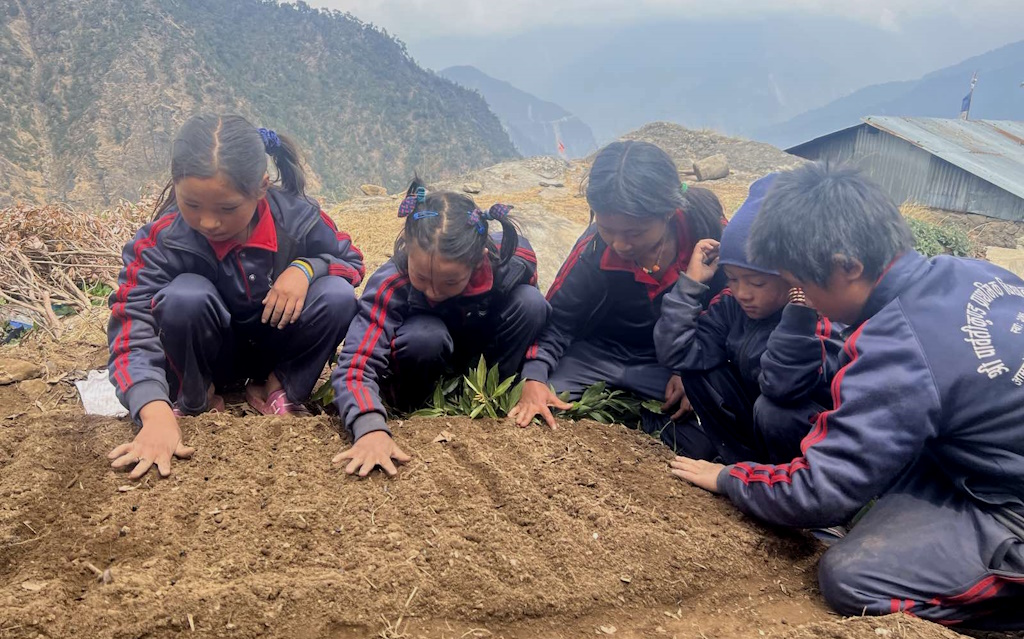<
Rainy season
August 2023
The rainy season is in full swing. The plants that were recently sown and planted are already getting more than enough water. Schools are closed for a few weeks and will reopen before the end of the monsoon.
For some children, going to school during the rainy season is not easy. Heavy rains turn some paths into streams and landslides are no exception.
It happens that some children simply cannot get to school because it is too dangerous on the way. They then stay home for several days, even weeks which obviously does not help their school performance. As much as one wants to go to school, one does not take the risk, which is quite understandable.
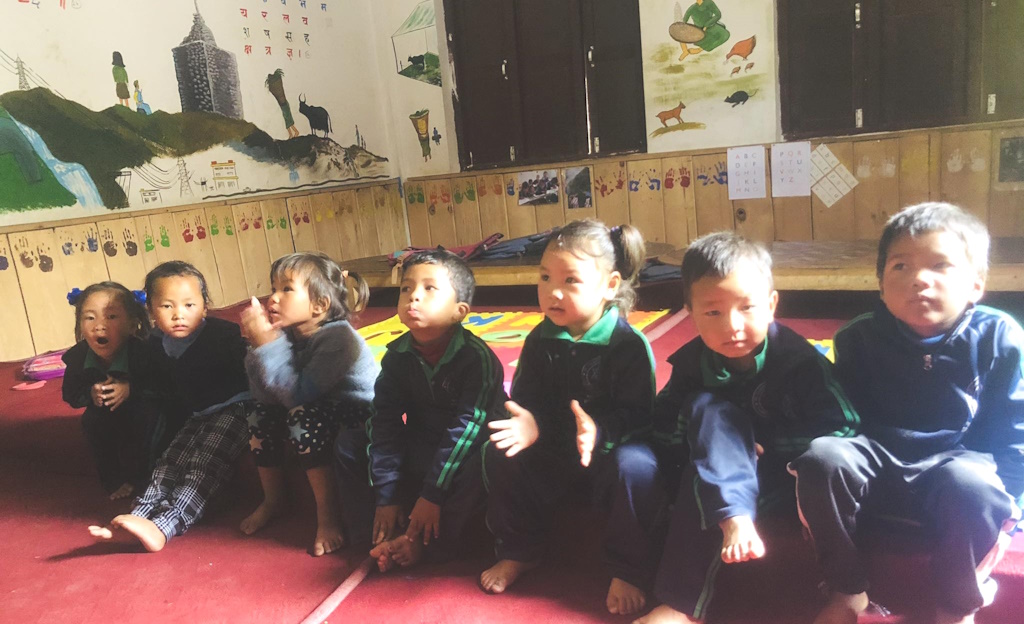
Schools have regularly asked us if we could help set up temporary hostels for these children. This way, they would stay near the school during the monsoon period and would still be able to attend classes.
As sorry as we are and as much as we would like to give these students a chance at education, we cannot respond. On the one hand, we do not have the resources to help; on the other, it is an ethical issue. We think it is better for the children to stay in their familiar surroundings with their parents.
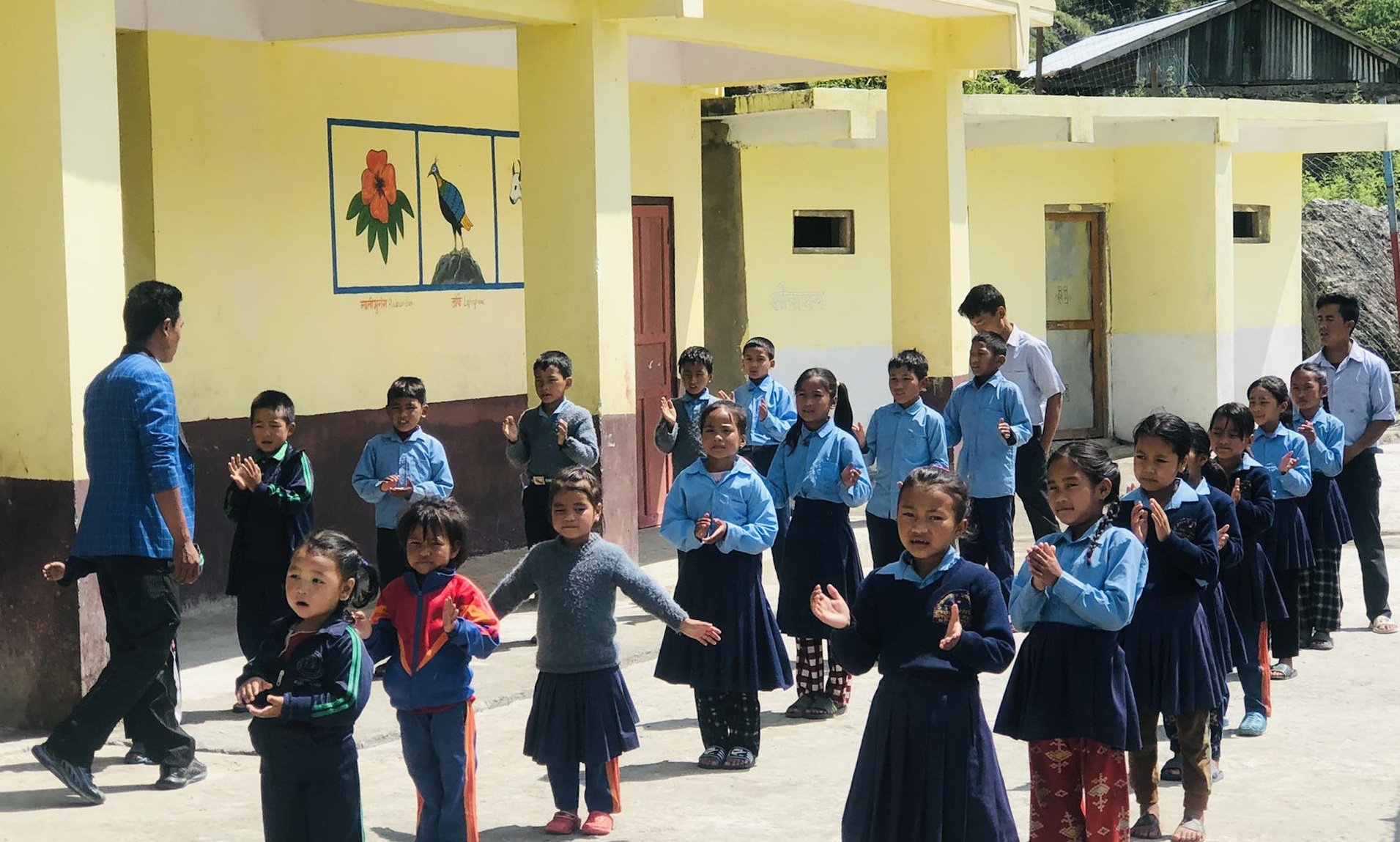
Since CEPP started the education project in the five Haku schools, we have seen parents becoming more and more involved in the schools’functioning. For the teachers and certainly for the headmasters, this is a major upheaval. We can understand the change is sometimes difficult for them.
Parents have become much more vocal, which is not always appreciated by teachers. If a teacher doesn't show up, the parents start asking what the reason is. They do not take it lightly that their children do not get a proper education.
The CEPP staff who have been in the Haku villages for more than a year and a half now sometimes get a hard time, mainly from the school heads.
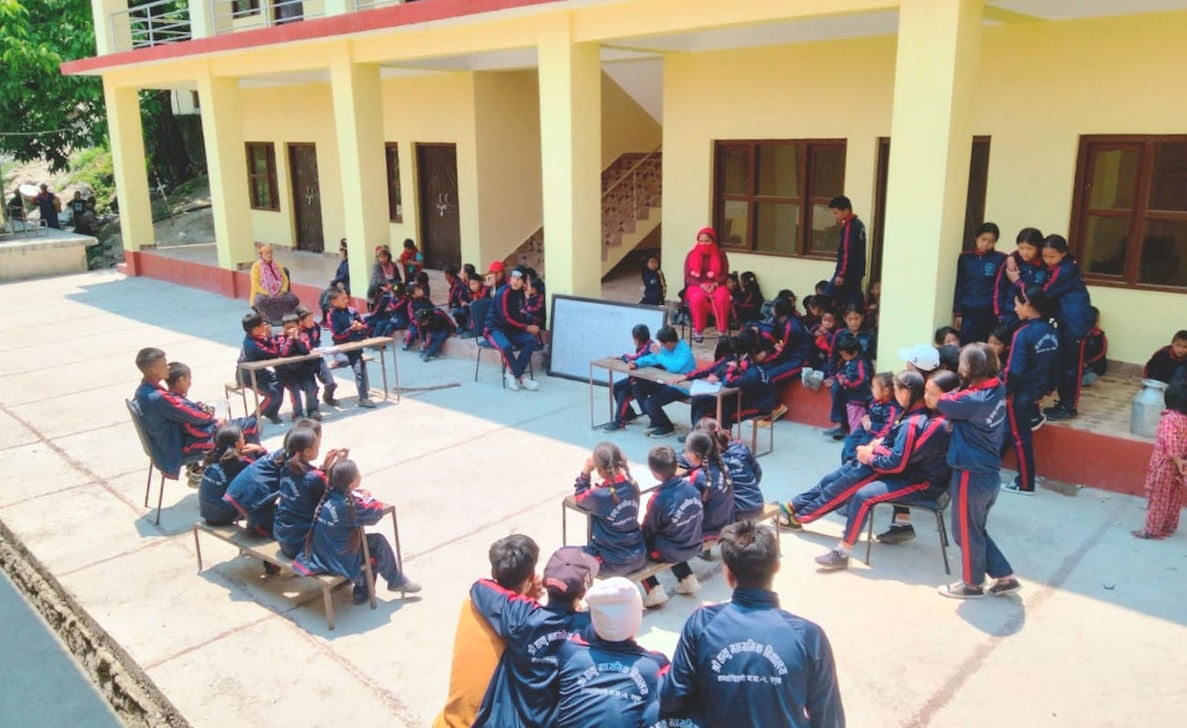
The challenge is now to work together for the sole purpose of striving to improve education.
Many of the teachers sat like kings on their high thrones and just did what they pleased. Now that there is more parental involvement, they need to get much more involved.
Change is always exciting, challenging and requires a lot of commitment and openness. It is searching together for a different way of dealing with pupils and with parents, a different way of teaching. Searching to work with natural and sustainable resources. We are curious to see how things will progress…
In turn, the green garden volunteers, parents of school children and other villagers are wildly enthusiastic about the cooperation with CEPP. They feel heard, supported and see that education and the cultivation of fruit and vegetables can also be done differently.
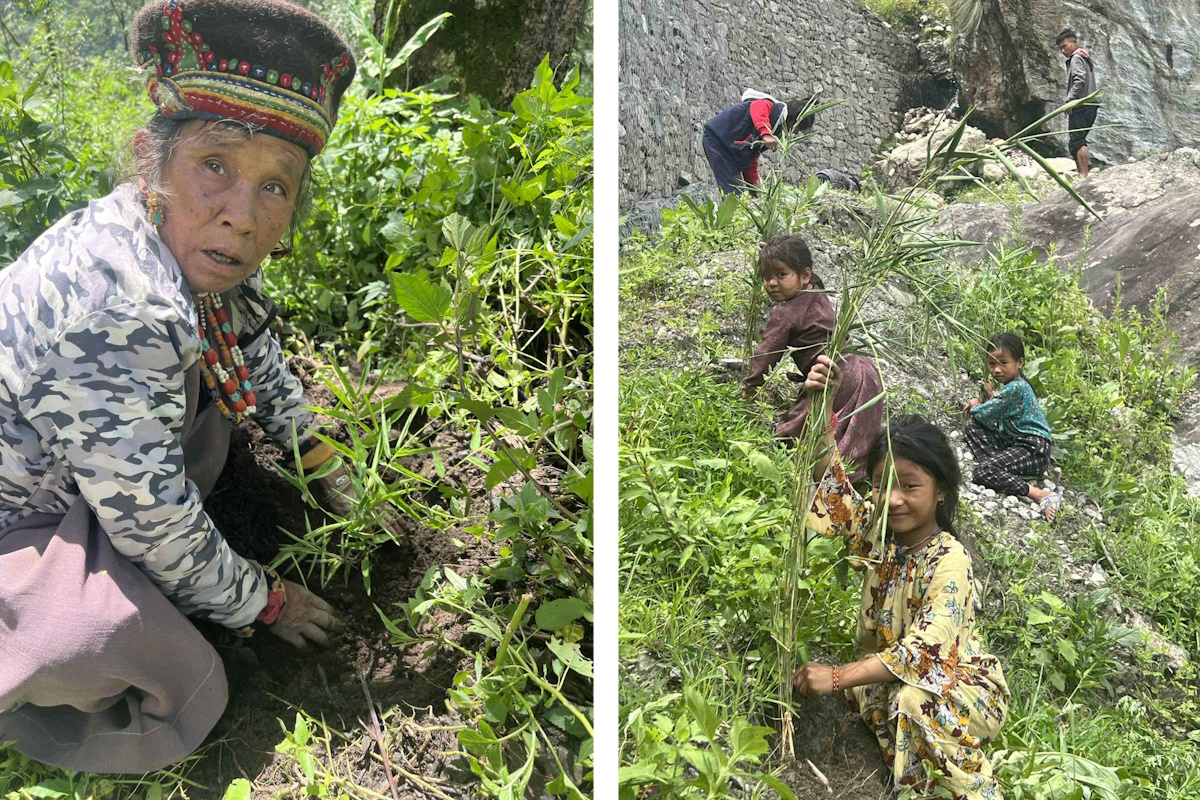
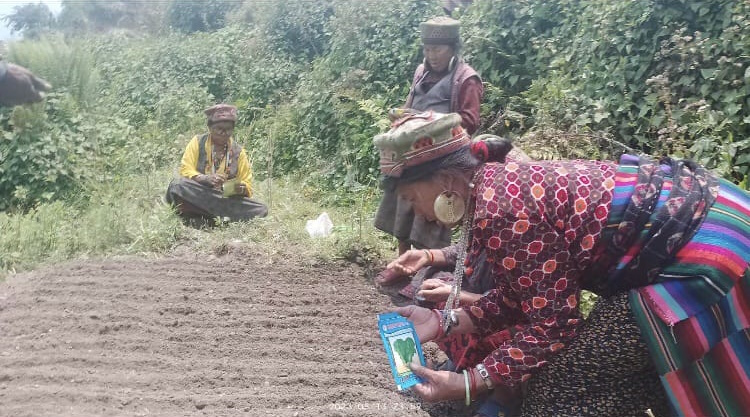
Meanwhile, we are busy organising an 'eye camp'.
Together with the French organisation Saint Chamond Espoir, we want to send a group of French opticians to the Haku villages in the autumn of 2024. Students from the five schools in the Haku community will then be able to undergo an eye test. Those who need it will be given glasses.
The villagers asked if we could also send an ophthalmologist along because many people have problems with their eyes. They cannot get to an ophthalmologist for proper diagnosis and treatment. Cataract operations are also in demand.
We are looking into what is possible because we have to follow the rules imposed by the Nepalese government.
Babu Lal Tamang, who helps us with several other projects and already organised an eye camp in the past, will help us now too.
He will contact a Nepalese ophthalmologist asking him to take action in the Haku villages as well. We hope it will be successful and affordable.
If we can set up an eye camp with both the ability to give glasses to young people who need them and to help the elderly who have poor eyesight with cataract surgery, this would be fantastic.
Even if the glasses come from neighbouring China, we should start preparations now. All sorts of evidence on paper is required and various approvals need to be obtained beforehand. We still have more than a year but we are already working on the applications and organisation.
If you want to help then your support is welcome on Bikas' account number BE32 2200 7878 0002 with reference to Haku.
Thank you - Dhanyabad
Betty Moureaux, president of Bikas npo

|
|
A new school year
May 2023
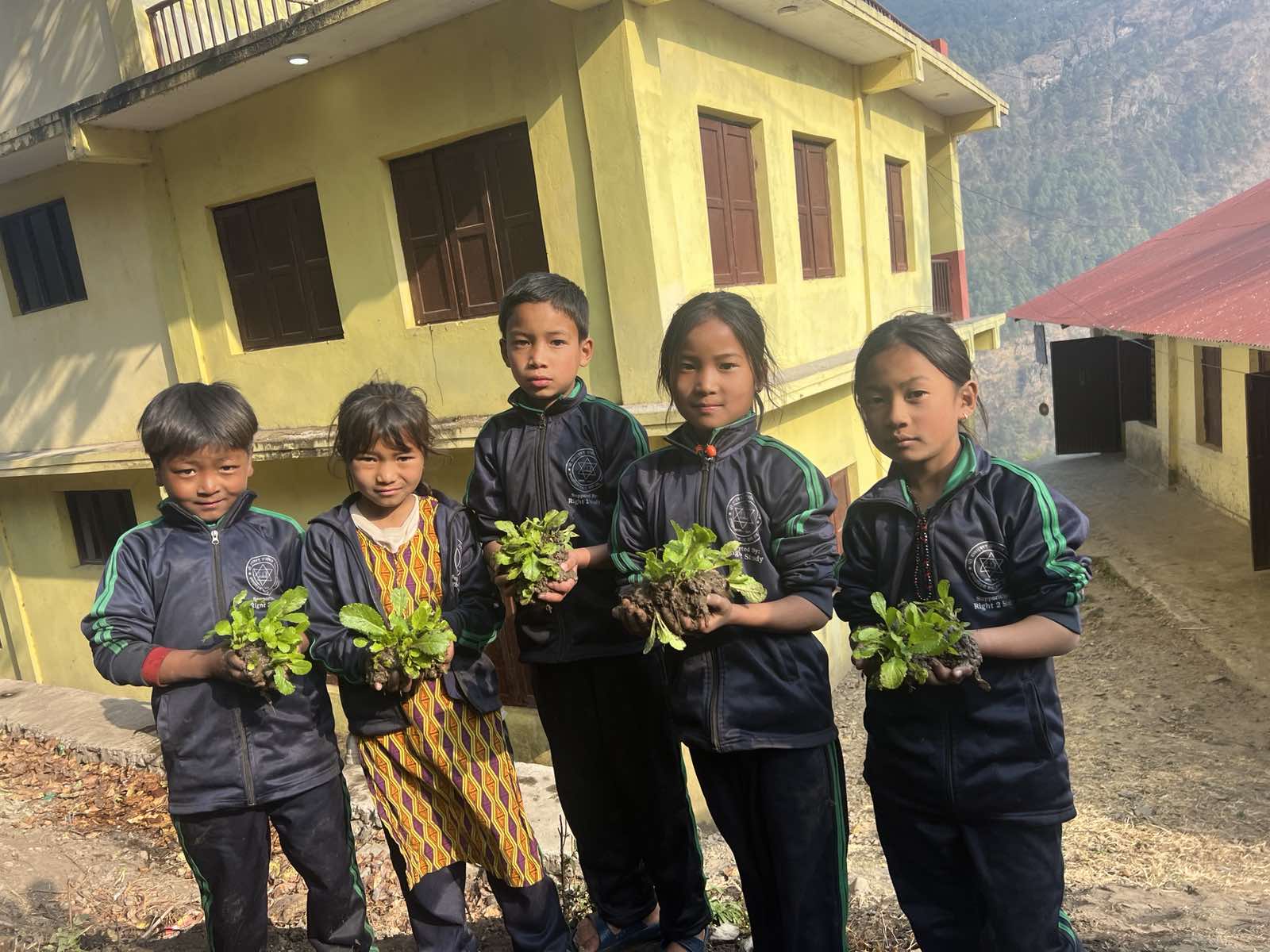
The old year came to an end and we welcome the new year 2080. The school year also came to a close. After the final exams came a short school holiday. Everyone was looking forward to a little rest. Teachers, many from other regions, returned to their families for a week.
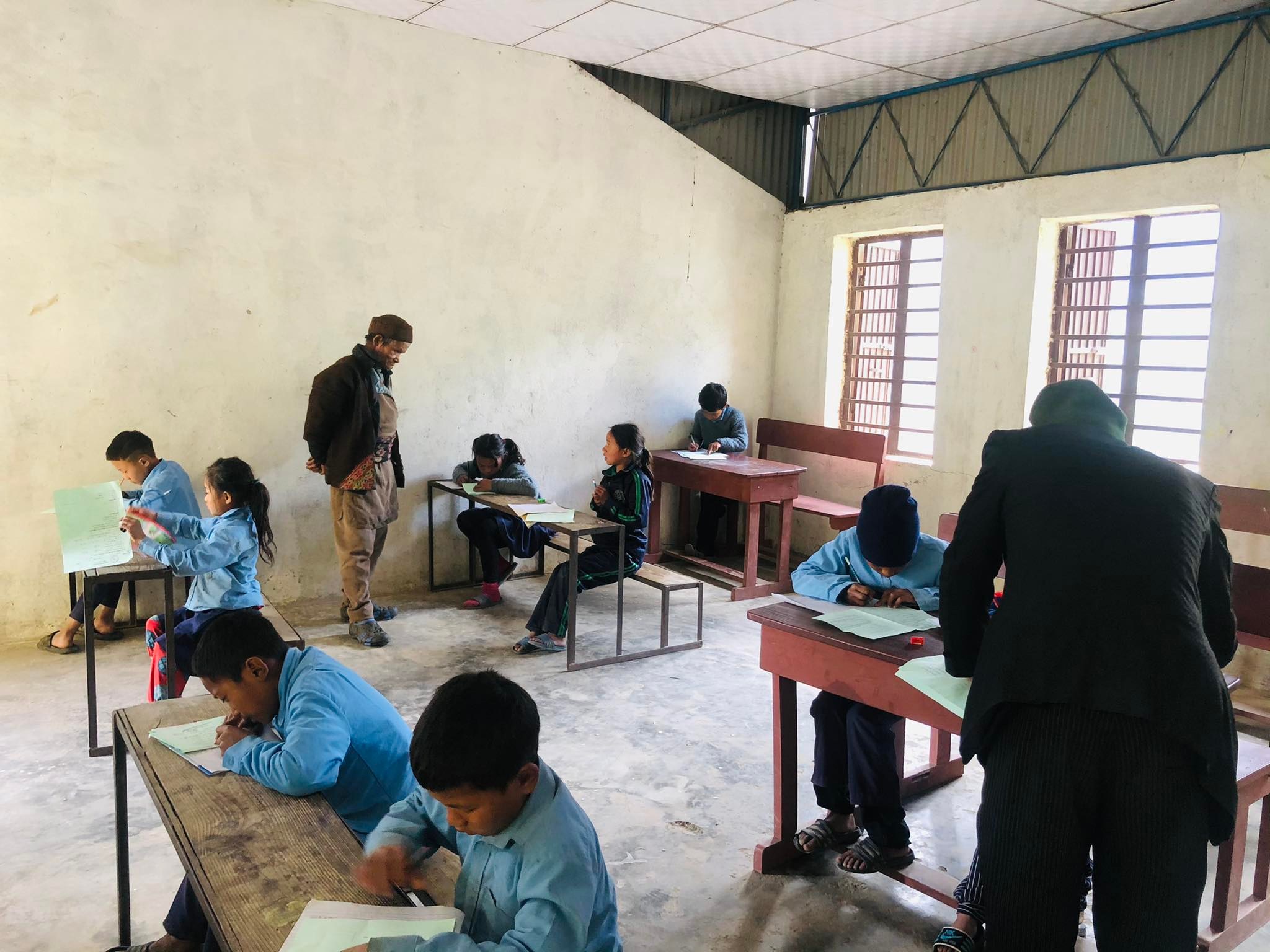
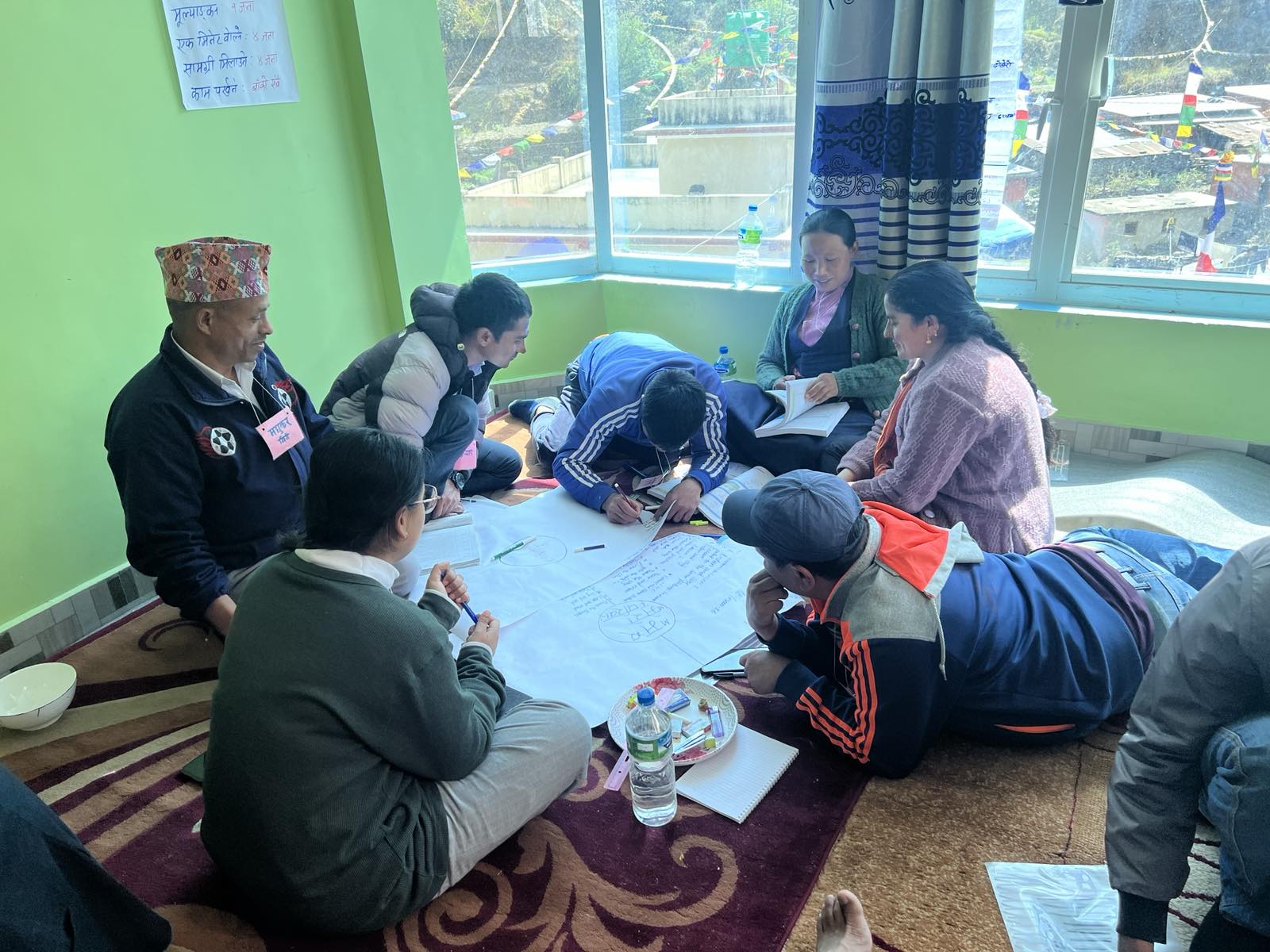
Arjun, the young employee of CEPP - Centre for Educational Policies and Practices - who lives in Thulo Haku, stayed in the village and looked after the vegetable gardens.
Bishnu also took a break but first she and other CEPP staff members gave another training session.
During exam periods, CEPP staff could not work in the schools. At the request of the local education officer, a workshop was organised for the surrounding 12 schools. A four-day training with 21 teachers was held in Chilime, the main town of the district.
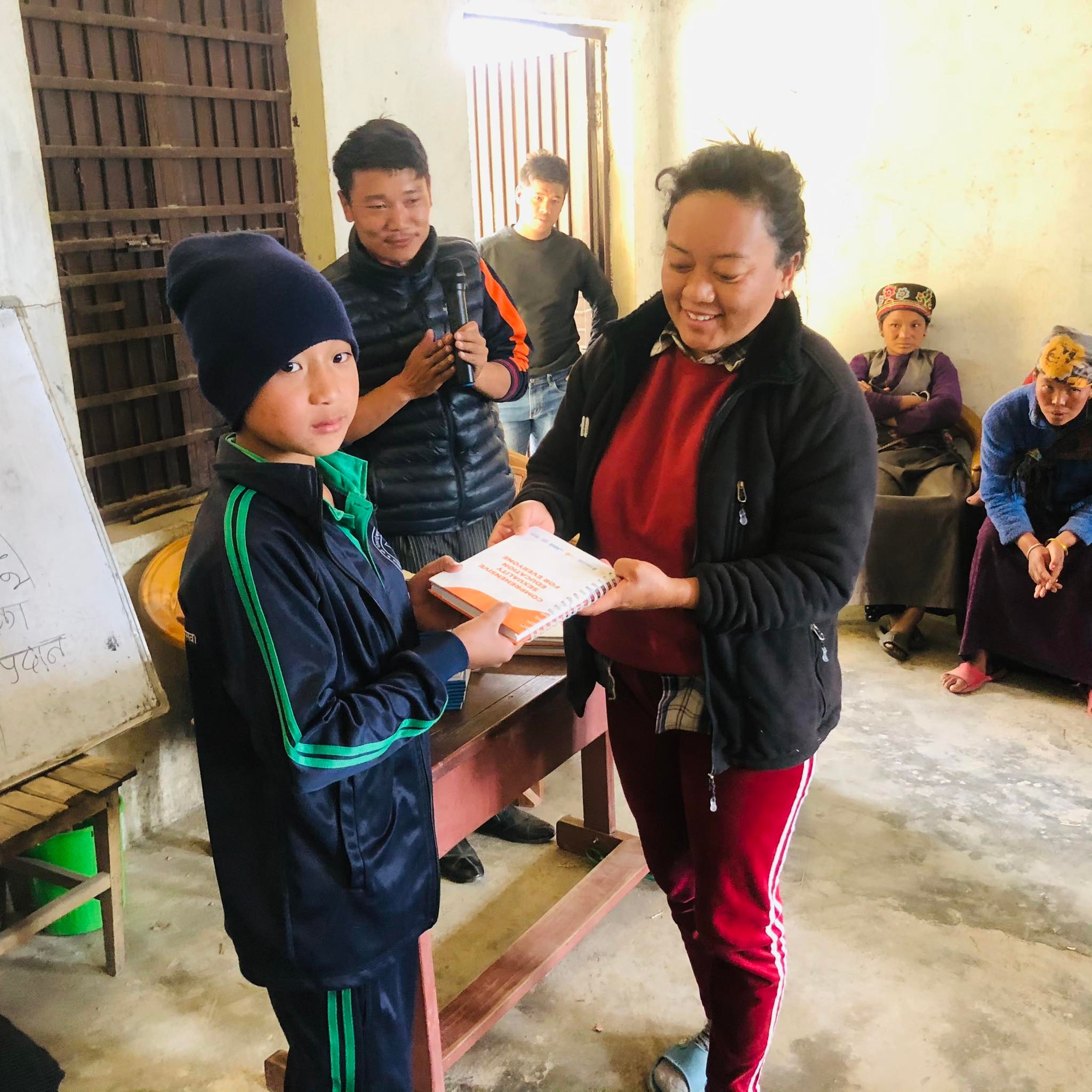
During the training, teachers interacted with each other on integrated teaching practices and tried out the possibilities.
The teachers made educational materials from local resources. They discussed how to teach interactively and make lessons more engaging.
They learned methods to improve the relationship between teachers and students in order to strengthen this bond.
The teachers who participated in this training were all very enthusiastic. According to them, this was the most valuable training they had ever received. They were already looking forward to putting the acquired knowledge into practice.
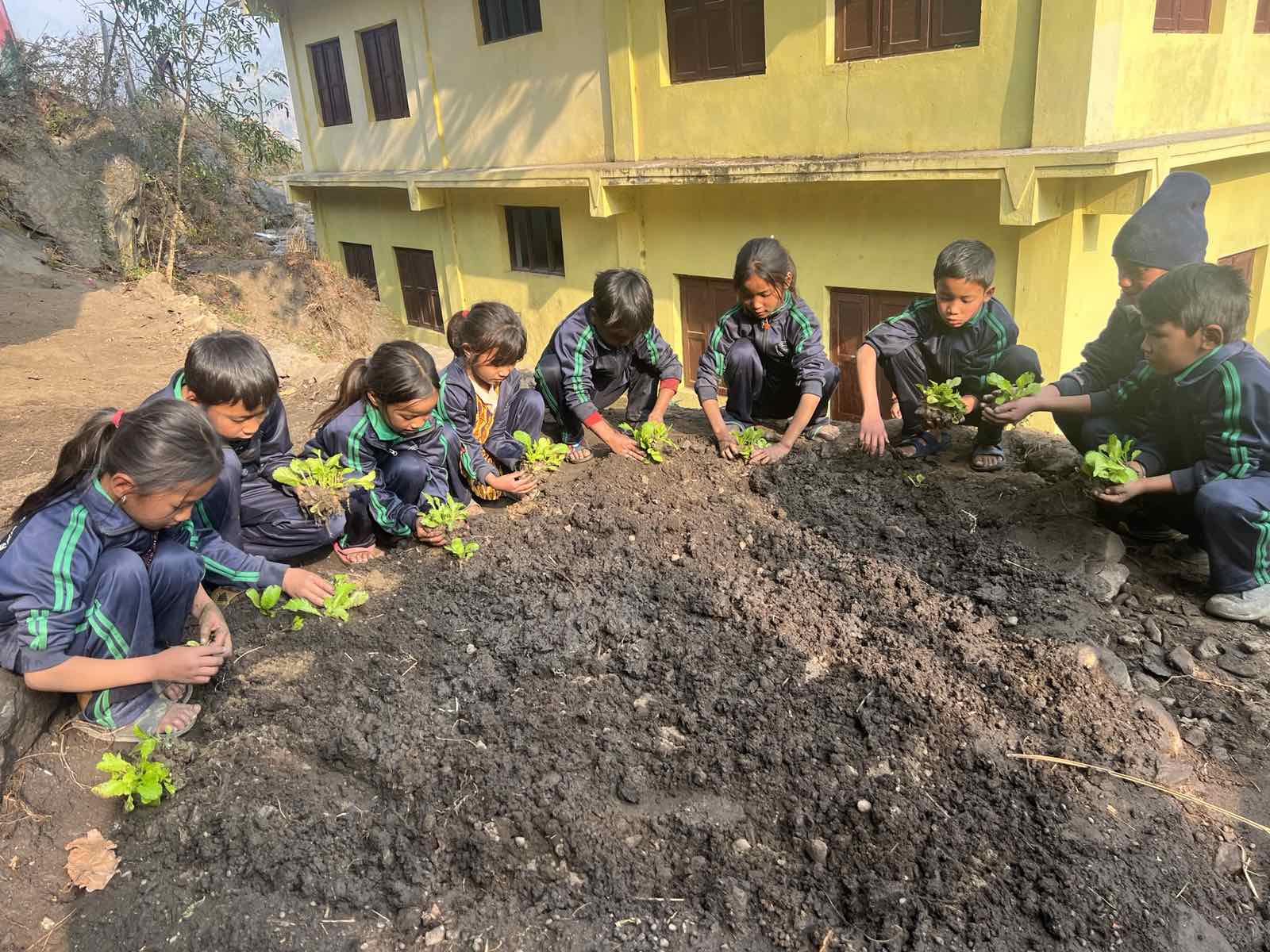
Meanwhile, the new school year has begun. Textbooks have been distributed, schools are filling up again and expectations are high. We look forward to what this school year will bring.
We wish the teachers an exciting year in which they can integrate new teaching methods. Also that there may be a pleasant, growing and positive cooperation between the schools on the one hand and with the students and their parents on the other. We wish the students the opportunity to gain knowledge in a safe and child-friendly school and to do so in their own familiar environment. Every child has a right to education but in remote areas, where children often have to work at home, this is not so obvious.
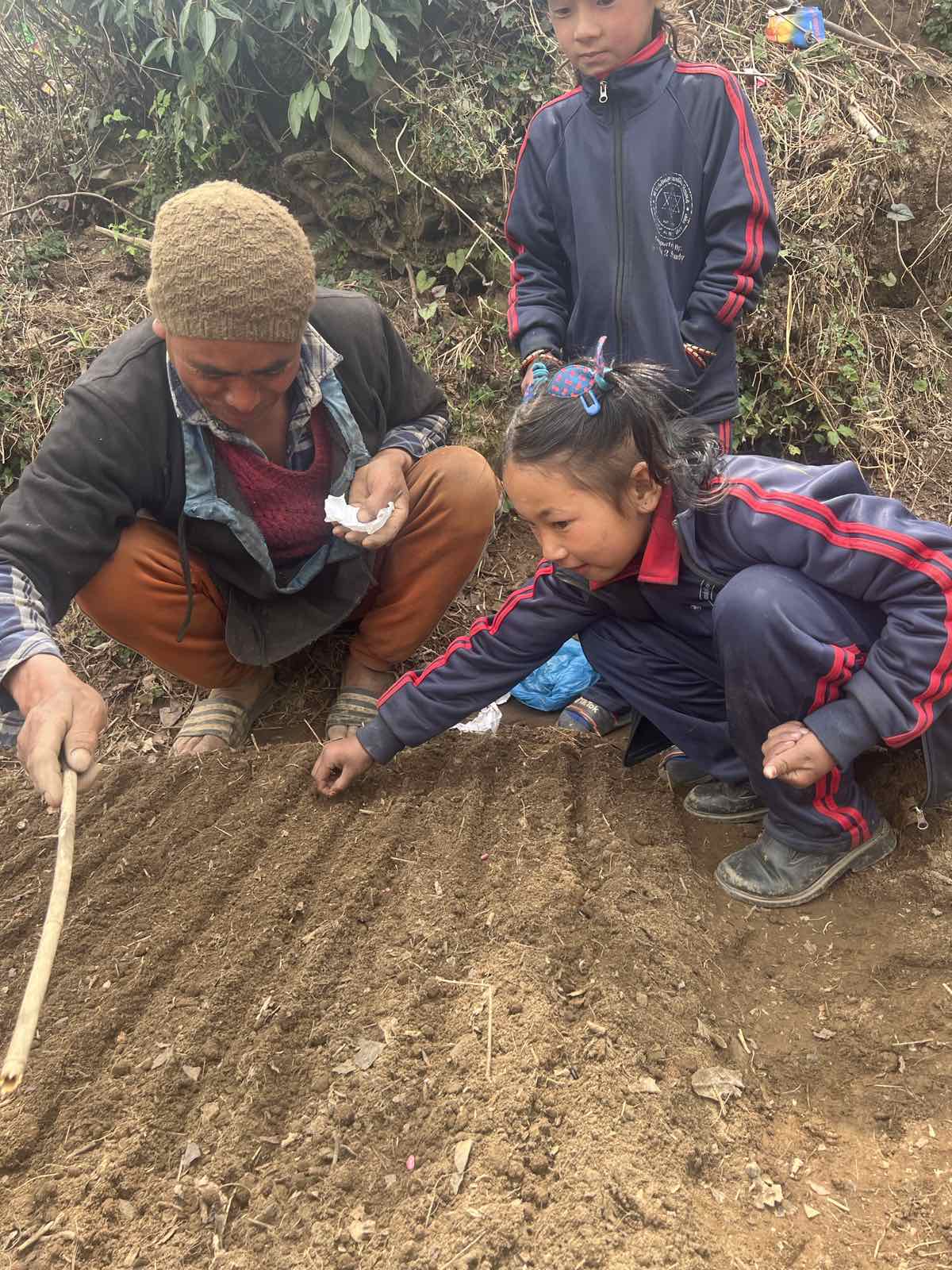
A new school year will also bring unprecedented challenges. CEPP will again do its utmost to help the schools of the five Haku villages in their growth and development. CEPP staff will again go from house to house to support and encourage parents to actively follow up their children in their schooling. Teachers will again be given training and encouraged to give their best.
Bikas is very happy to work together with CEPP to ensure a better future for hundreds of children from this region.
If you want to help then your support is welcome on Bikas' account number BE32 2200 7878 0002 with reference to Haku.
Thank you - Dhanyabad
Betty Moureaux, president of Bikas npo

Inauguration of the school and operation of CEPP
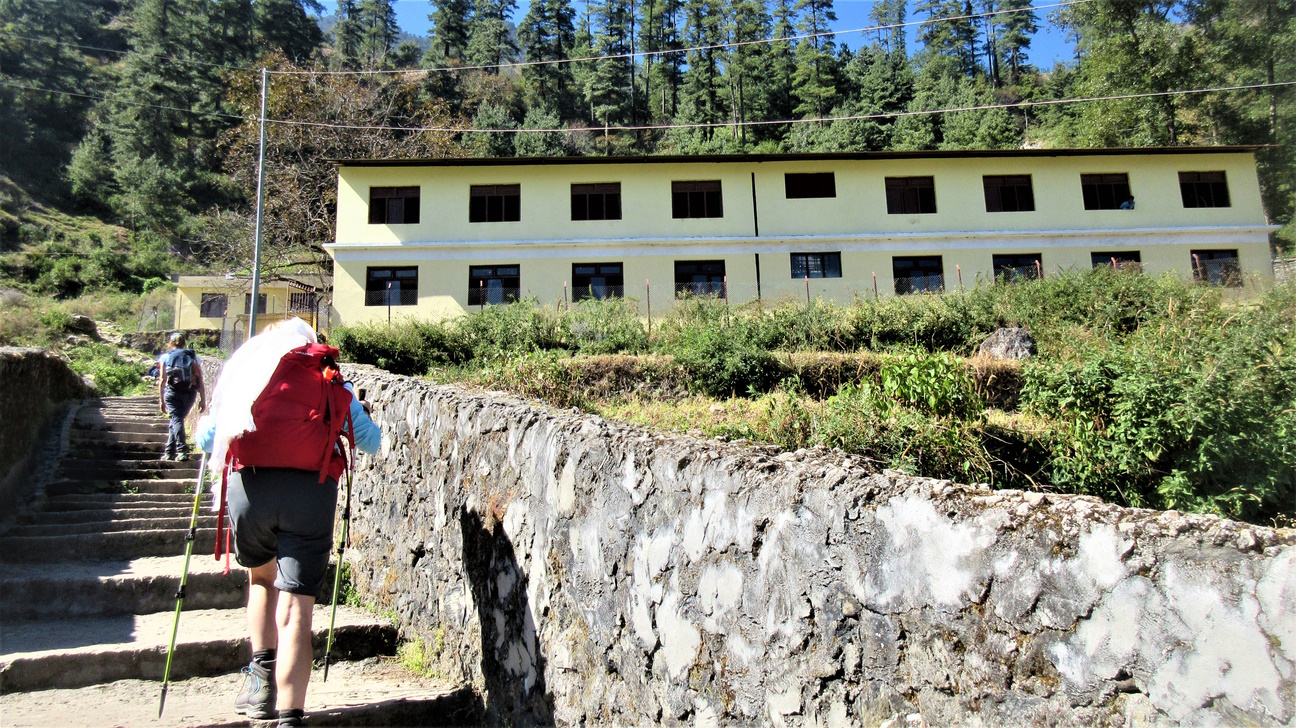
February 2023
On 2 November 2022, it was celebration time in Thulo Haku. The new school, two storeys high and eight classrooms big, was finally inaugurated.
Bikas worked with the local government to make sure the school building was there. During the major earthquake of 2015, this school had been completely destroyed. Seven years later, a new and sturdy building finally stands.
The students, teachers and also the parents who helped with the construction were now proud to show off their new school.
As president of Bikas and project leader of the Haku project, I was very well received along with a group of sponsors/ travellers from Anders Reizen. Our webmaster Omer D'Hondt was also present .
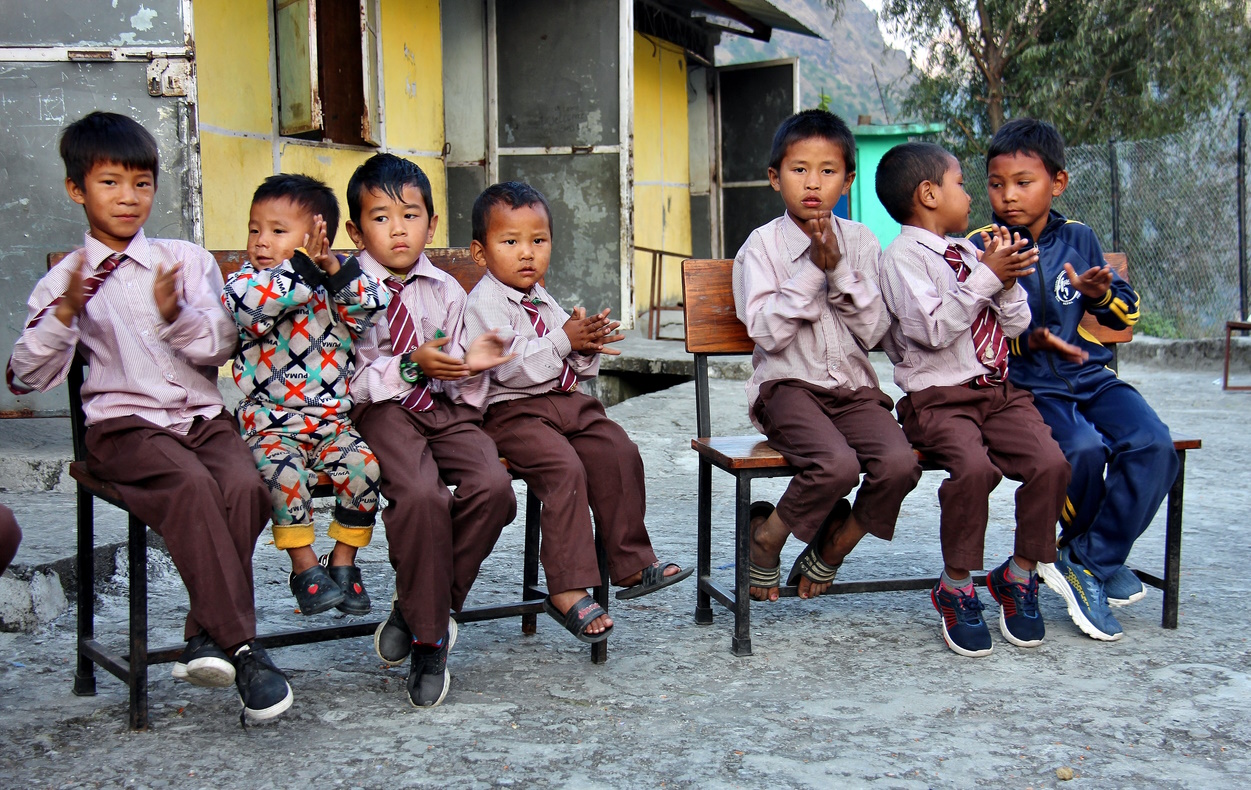
A hellish bus ride took us from Kathmandu to Haku Besi where we were met by Tamang friends. Here our trek began and half an hour later we were met at Haku Besi school by the headmaster, students and parents. We were offered drinks and khatas, the traditional prayer shawls, were hung around our necks.
We were allowed to sit on the school benches we had sponsored while children sang and danced for us.
I was ushered away to see the school furniture donated by Bikas.
The colourful round tables we had commissioned for the little ones, blackboards, computer tables and projector were displayed with pride.
Everything turned out to be very useful.
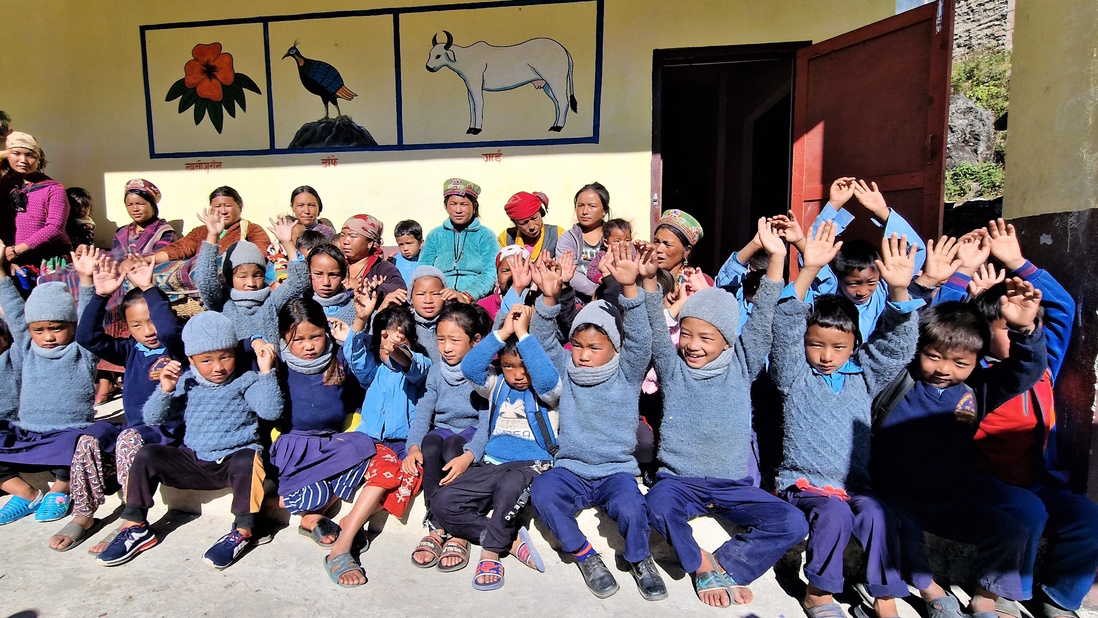
After the ceremony, we continued on our way and just before dark, we reached Pangling, Sanu Haku.
Here too, we were welcomed by the headmaster and by the staff of CEPP - the Centre for Educational Policies and Practices.
Michel Rai had come specially from Kathmandu to use a powerpoint to explain to us what CEPP stands for and how they work. In every school in the four villages, they want to make at least one classroom child-friendly and educational. Classrooms are transformed into a cosy space where both teachers and children enjoy spending time.
Meanwhile, three classrooms have been furnished. One by one, they have become model classrooms.
Wooden boards with carpets on top provide a dust-free and warm floor.
With the addition of some cushion, the youngest children find it pleasant to be there. But what stands out the most are the beautiful, colourful and educational painted walls.
Students from Kathmandu's Art Academy and a painter from nearby Dhunche have painted fragments of daily life, the human body, animals, mountains, fruits, vegetables and the alphabet on them, among other things. Rightly, they were very proud to display these beautiful classrooms.
The next morning, we were led through their beautiful experimental garden by the other CEPP staff, Ram Chandra, Bishnu and Arjun. We saw a passionate Ram Chandra who knowledgeably presented his Garden of Eden. The locals learned how to grow both known and new types of fruits and vegetables.
We saw onions, beans, carrots, coriander... but also kiwis and papayas.
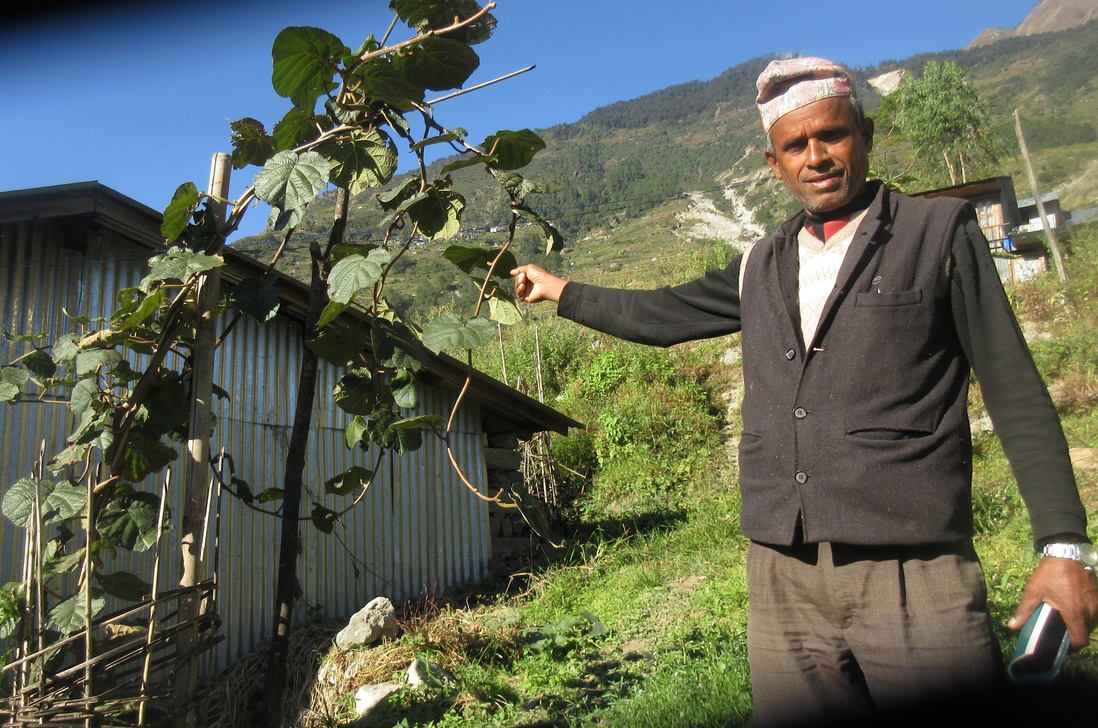
Thanks to the varied supply, the villagers' diet is now enriched with delicious, fresh and home-grown vegetables and fruits packed with vitamins.
A volunteer couple has been assigned to each experimental field to learn a lot under the watchful eye of Ram Chandra. In turn, they pass on this knowledge to the other villagers. The enthusiasm shown by Ram Chandra is clearly contagious. Almost every household now has its own vegetable garden.
The location of the experimental plots near the schools creates an exchange of information. The students follow along with the processes of the nurseries. They are taught in the experimental fields, help with cultivation, see everything grow and, when the time is right, they harvest and taste what they have sown themselves.
| Celebrations at Thulo Haku |
And then the day of the inauguration of the new school building finally arrived. Due to the corona pandemic, the construction and inauguration had been pushed back by three years.
Meanwhile, the main village square had filled up with spectators. The students of the school but also many people from the village community were present.
People had made a gateway above which hung a banner with the Nepali and Belgian flags on it. Tamang women and men in traditional costumes were waiting for us. For the occasion, I had also put on a Tamang dress with accompanying handmade hat.
The Belgians and one Dutchman from our group were given the places of honour alongside some prominent members of the village and school community. Traditionally, speeches, thanks, khatas, traditional dances and drinks followed.
The whole event was a vote of thanks by the school and village community to the people who made it possible to realise this project.
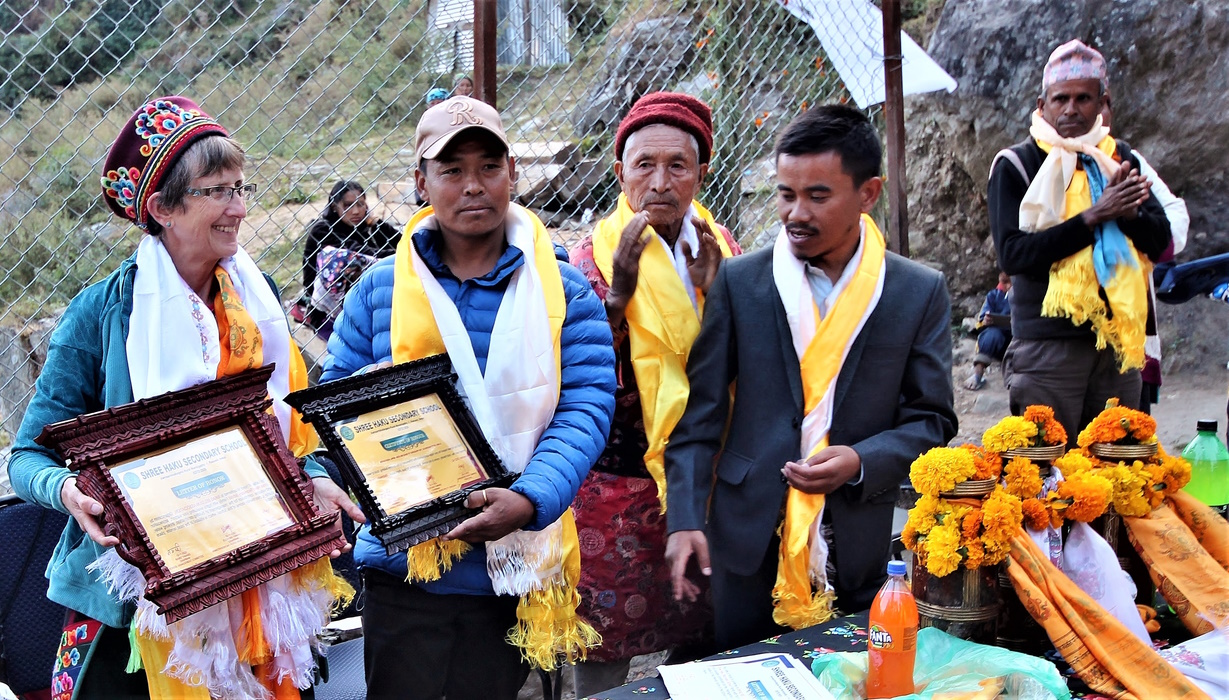
Spread the word they said ... thank you to everyone who supported.
The school is handed over to the school community who are in charge of its management. An official inauguration plaque is hung on the school building.
After many pictures and many happy faces, the day draws to a close.
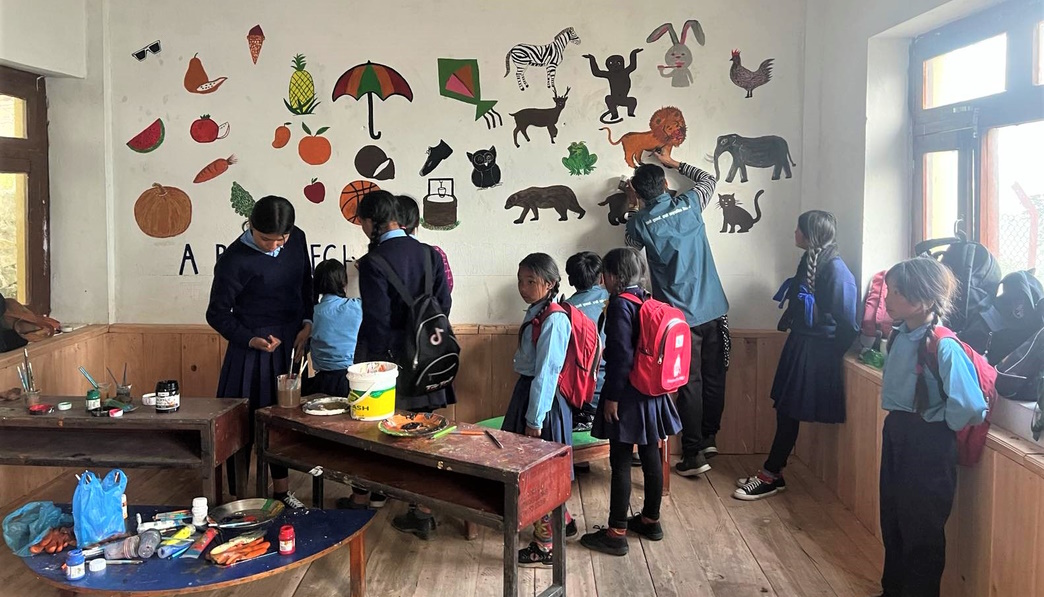
It is encouraging to see what has already been achieved at Haku.
The building process is behind us and now we are concentrating on the content of education.
Together with CEPP staff, work is now underway to improve primary education in a safe, friendly and child-centred environment. Gradually, an awareness of the importance of sound education in one's own environment is emerging.
Where previously little or no attention was paid to the youngest children, people are now realising that a good foundation is also very important in education.
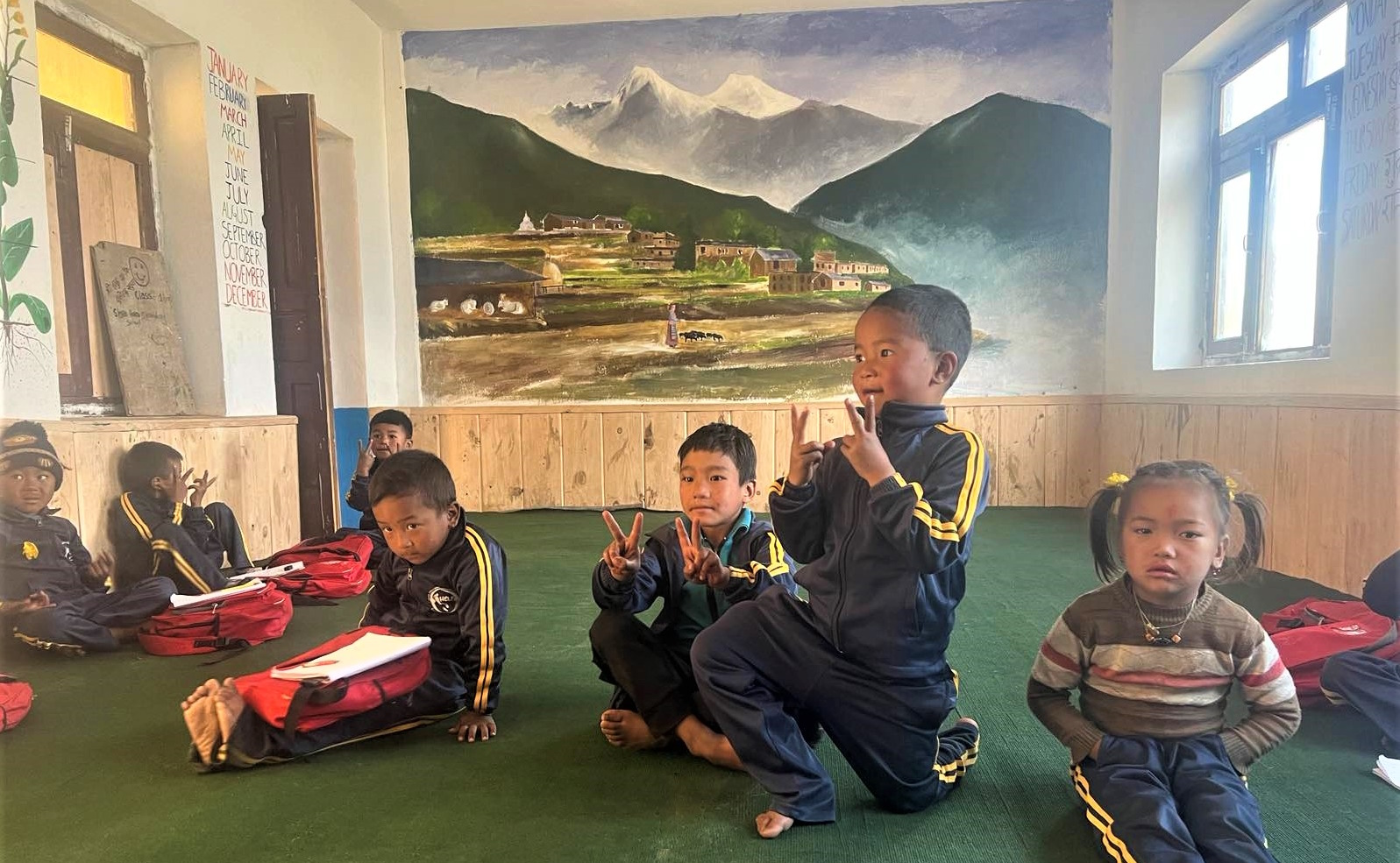
A clear growth process is underway. They learn a lot while playing. Attention is paid to better hygiene, classrooms and playgrounds are maintained, access paths are regularly cleaned up, improved agricultural methods are taught, landslide problems are tackled and environmental responsibility is sought.
A very important innovation is the involvement of parents in their children's schooling. Parental control and pressure on schools is something new. Parents are encouraged to supervise their children's education. They take turns attending school one day a week. They motivate their children to attend school and encourage the teachers. If parents follow up on a school project then one can get a lot done.
I could see with my own eyes that there are immense changes in the Haku villages.
Sometimes it is difficult but still they have come a long way.
Starting this year, the neighbouring village of Grey and its school will also be involved in this project. Grey belongs to the Haku village community. They had already asked to be involved at the start but this was not granted at the time, partly for financial reasons.
Obviously, costs are rising, especially now that everything is getting more expensive. Still, we think this project that is very valuable and sustainable deserves our support.
When we see what has already been realised in the Haku villages, we look forward to the future with hope.
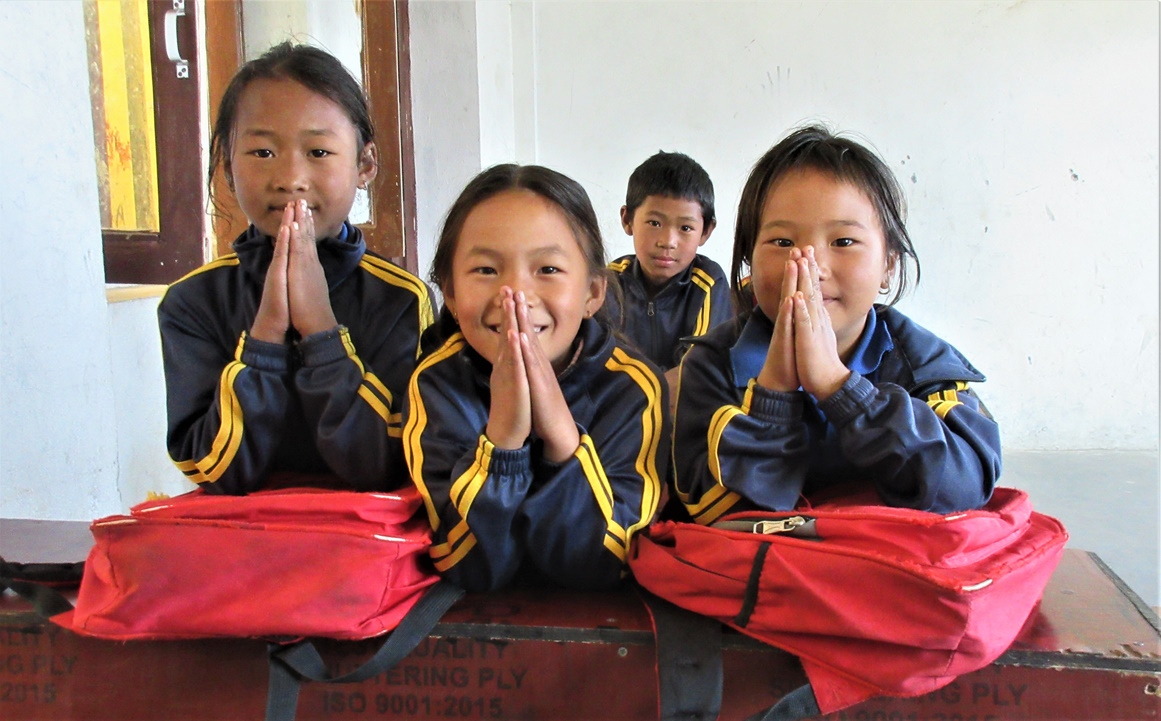
If you want to help then your support is welcome on Bikas' account number BE32 2200 7878 0002 with reference to Haku.
Thank you - dhanyabad
Betty Moureaux, president of Bikas npo

November 2022
It has been a long time coming but this autumn, the moment is finally there. The inauguration of Thulo Haku school is scheduled for early November.
In the presence of a group of tourists from Anders Reizen, the school will be officially inaugurated and handed over to the school community. From now on, this group will own and manage the new building. They will have to take care of the school that was built in cooperation with the local government and with the help of the many villagers.
The eight-classroom building came about at the request of the community. The previous school was completely destroyed by the major earthquake in 2015. Students were temporarily taught by soldiers who had never been in front of a classroom before. The period after the earthquake was still traumatic for many children; the immense fear of a repeat of a disaster like this one lingered for a long time.
Nevertheless, teaching was restarted as soon as possible so that the children did not wander around the villages aimlessly. A few months after the earthquake, with the help of many sponsors, we were able to temporarily install school barracks. Slowly the desire and hope grew to build decent permanent and above all safe schools.
We started with schools in Nessing and later in Sanu Haku (Pangling). Finally, it was also the turn of Thulo Haku. In both Nessing and Sanu Haku, we built two classrooms. In Thulo Haku it became eight classrooms whose construction was spread over three years. The laying of the foundation stone was in autumn 2019. At that time, we still thought everything would be ready in 2020 and we would do the opening ceremony then. Unfortunately, the global corona pandemic delayed the whole process and so it became impossible to finish the school before 2021. In the meantime, a request had come up to build a floor on top of the four classrooms. So it finally became early 2022 before the school was completely finished.
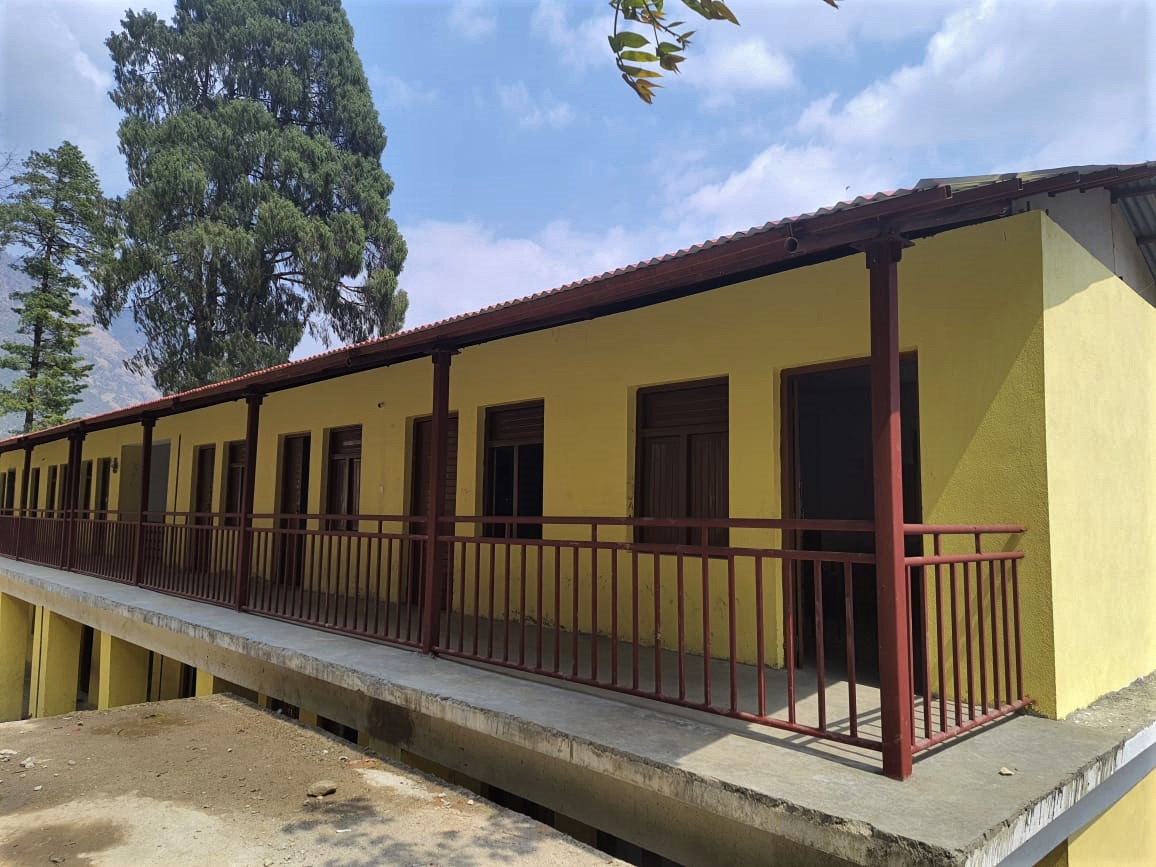
Throughout the construction period, no one from Bikas had been on site and we had had to content ourselves with photos and videos received through social media. Despite the fact that we were not physically present, we were still able to follow the evolution. It was impressive to see how people could realise such great works with simple means. People worked very hard to get everything on site and build the school.
After the school building was there, an extra fence was built. An additional water project now provides the school with potable water. The necessary school desks were also made. Thus, they gradually refined the building and its surroundings.
After years of commitment to the construction and everything related to that process, we started supporting the teachers and the actual teaching at the beginning of this year. Together with our local partner CEPP - Centre for Educational Policies and Practices - a change was slowly brought about. The importance of sound education in the nearby environment was now highlighted.
Teachers learned how to teach by using simple means. The relationship between parents and teachers and students improved tremendously in just a few months. Motivation and eagerness to learn ensured that the number of children attending school gradually increased. We see a beautiful educational growth process, but there is still a long way to go.
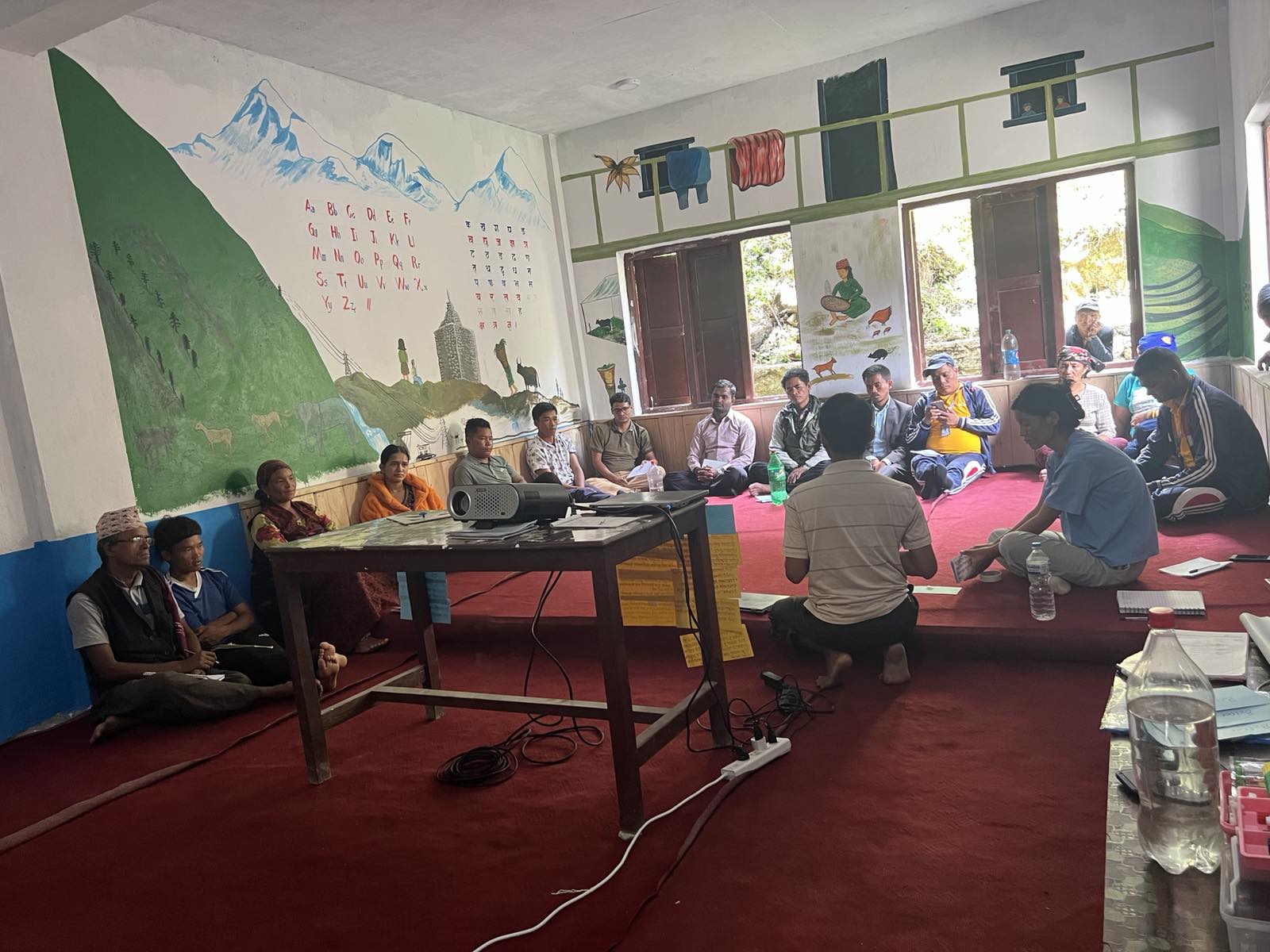
As before in Pangling, CEPP is now furnishing a classroom in Thulo Haku so that people can teach there in a clean, pleasant space. A nice classroom encourages not only teachers but also students to come to school and encourages users to improve the other classrooms as well. We are therefore very excited to be able to visit this finished classroom.
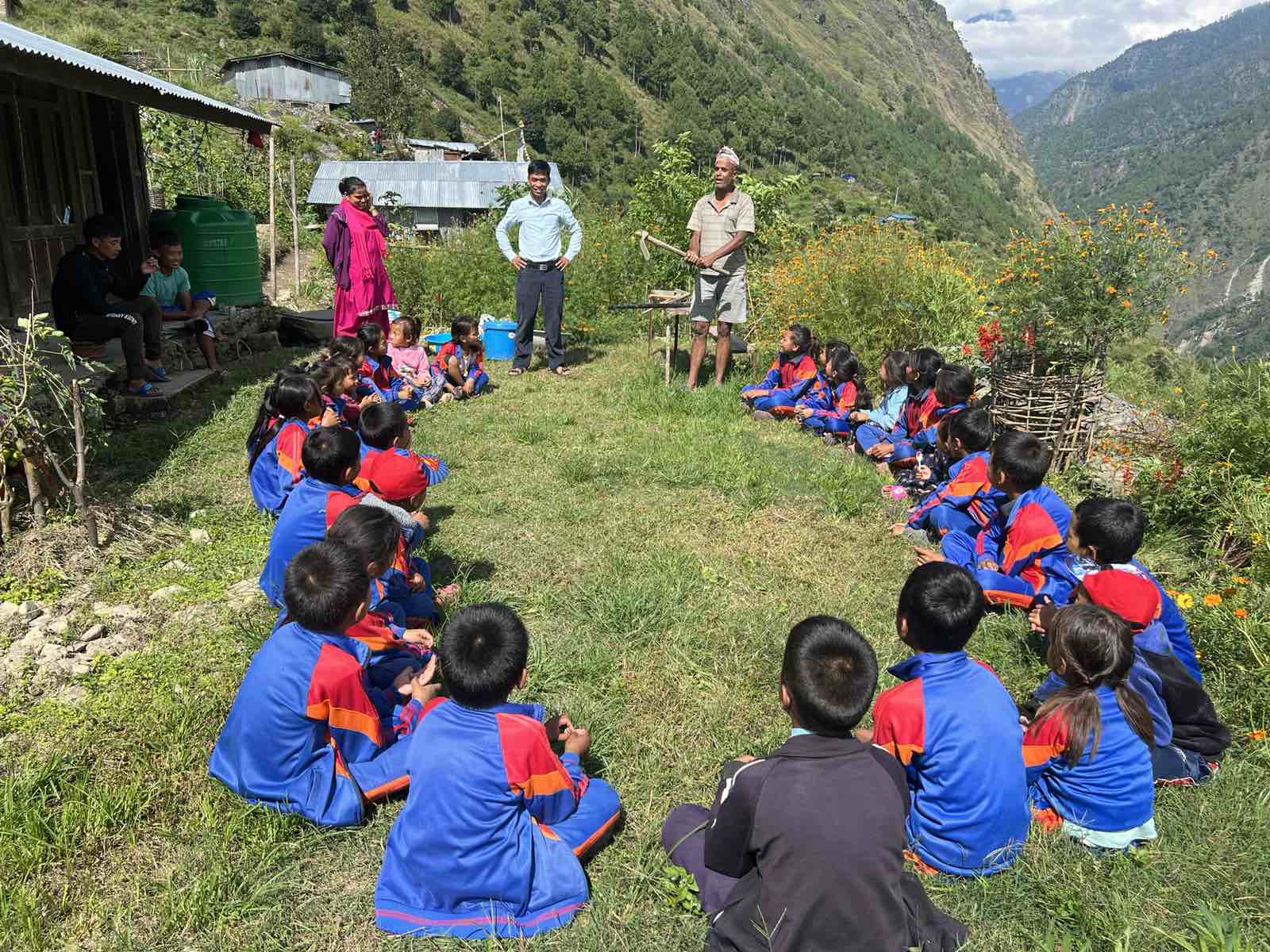
Meanwhile, Bishnu and Ram Chandra, the two CEPP staff in Haku, have again moved mountains. There were consultation moments with the parents of the students in the four villages of Haku. One worked with the students on nature conservation, there were trainings on hygiene, a thorough clean-up was done around the schools but also in the villages and on and around the paths and roads leading to them. From house to house they went to talk to people about education, hygiene, nature conservation, etc. Every time, I am amazed that two people can change so much in a village community that was otherwise not interested in any change. Big congratulations to CEPP. I am already looking forward to meeting these two collaborators in Haku and seeing their work with my own eyes.
By the time the magazine is published, the school in Thulo Haku will have been inaugurated. We are already trying to add some photos now. Next time, you can read how this all went. After three years, I am finally returning to Nepal...how long this has taken! I am very curious to see with my own eyes all that has changed in these three years in the Haku villages. It will be a happy reunion...exciting!
Those who want to support the Haku villages can make a contribution to Bikas' account number BE32 2200 7878 0002 with the mention 'Haku'.
Thank you, dhanyabad
Betty Moureaux, chairwoman of BIKAS asbl


